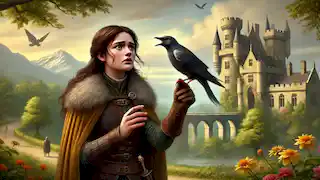Pwyll, Prince of Dyfed
Pwyll, Prince of Dyfed, stood upon the hilltop, gazing out over his vast kingdom. The rolling green hills and dense forests stretched as far as the eye could see. Pwyll was a just and fair ruler, beloved by his people, but he often longed for excitement and adventure beyond the borders of his peaceful realm.
One day, Pwyll decided to go hunting in Glyn Cuch, a forest known for its abundant wildlife. As he rode deeper into the forest, he spotted a majestic stag. Pwyll gave chase, urging his horse forward. The stag was fast, but Pwyll was determined. He soon found himself in an unfamiliar part of the forest, where he encountered a pack of shining white hounds with red ears, unlike any he had seen before.
Intrigued by the sight, Pwyll watched as the hounds brought down the stag. Suddenly, a tall, noble-looking man appeared, rebuking Pwyll for allowing his own hounds to interfere. Realizing his mistake, Pwyll apologized and offered to make amends. The man introduced himself as Arawn, the King of Annwn, the Otherworld.
Arawn proposed a unique solution: they would switch places for a year and a day. Pwyll would rule Annwn while Arawn dealt with his own affairs in Dyfed. Arawn's primary concern was defeating his enemy, Hafgan. Pwyll agreed, and the two men exchanged appearances and identities.
During his time in Annwn, Pwyll fought and defeated Hafgan in single combat, ensuring peace for Arawn's kingdom. When the year ended, Pwyll and Arawn switched back to their original forms, and Pwyll returned to Dyfed with a newfound sense of wisdom and a deep bond of friendship with Arawn. The people of Dyfed were amazed by the tales of their prince's bravery and the alliance he had forged with the Otherworld.
Upon his return, Pwyll's leadership grew stronger. He shared the lessons he had learned from Arawn with his advisors and knights. He also made changes to the governance of Dyfed, inspired by the practices he had observed in Annwn. This period of transformation brought prosperity to Dyfed, strengthening its position among the neighboring kingdoms.
Pwyll's marriage to Rhiannon, a beautiful and enigmatic woman from the Otherworld, further solidified his bond with the mystical realm. Rhiannon, who rode a swift white horse that no mortal could catch, brought her own wisdom and grace to Dyfed. Together, Pwyll and Rhiannon ruled with compassion and fairness, becoming legends in their own right.
However, their happiness was soon overshadowed by a series of challenges. Rhiannon gave birth to a son, Pryderi, but the night he was born, the infant disappeared mysteriously. The palace maidservants, fearing punishment, falsely accused Rhiannon of infanticide and claimed that she had devoured her own child. As punishment, Rhiannon was sentenced to sit by the gate of the palace for seven years, offering to carry visitors on her back and confessing her supposed crime.
Years later, the truth was revealed when a noble couple discovered a young boy abandoned in their stable. Recognizing him as Pryderi, they brought him back to Pwyll and Rhiannon. The reunion was joyful, and Rhiannon was exonerated, her honor restored. Pryderi grew up to be a brave and noble prince, beloved by his parents and the people of Dyfed.

Branwen, Daughter of Llyr
In the land of Harlech, a grand feast was held to celebrate the union of two great families. Bran the Blessed, King of Britain, had invited Matholwch, King of Ireland, to marry his sister Branwen. The feast was a magnificent affair, with lavish food, music, and dancing. However, the joy was short-lived as a series of unfortunate events unfolded.
Efnysien, Branwen's half-brother, was enraged that he had not been consulted about the marriage. In a fit of anger, he mutilated Matholwch's horses, causing great offense to the Irish king. To make amends, Bran gave Matholwch a magical cauldron that could resurrect the dead, although the revived would be unable to speak.
Matholwch accepted the gift and married Branwen, taking her back to Ireland. However, Branwen's happiness was short-lived. The Irish nobles, still insulted by Efnysien's actions, convinced Matholwch to mistreat her. She was forced into servitude, working in the kitchens and enduring great hardship.
Desperate, Branwen trained a starling to carry a message to her brother Bran in Britain. Upon receiving the message, Bran assembled a massive fleet and sailed to Ireland to rescue his sister. A great battle ensued between the Britons and the Irish. Efnysien, in a moment of redemption, sacrificed himself to destroy the cauldron, ensuring the Britons' victory.
Though Bran's forces triumphed, he was mortally wounded. He instructed his men to sever his head and carry it back to Britain. Branwen, grief-stricken by the loss of her brother and the devastation caused by the conflict, died of a broken heart. The surviving Britons buried Bran's head at the White Hill in London, where it was said to protect the land from invaders.

After Branwen's tragic death, her story became a symbol of resilience and the strength of family bonds. The people of Wales honored her memory with songs and tales, passing down her story through generations. Bran's head, buried at the White Hill, was believed to have magical properties that safeguarded the land from foreign invaders. The site became a place of pilgrimage and reverence, symbolizing the unity and protection of the Welsh people.
The events surrounding Branwen's marriage and the subsequent conflict with Ireland left a lasting impact on both nations. Diplomatic relations between Britain and Ireland were strained, but over time, efforts were made to foster peace and understanding. The tale of Branwen served as a cautionary reminder of the consequences of pride and the importance of empathy and reconciliation.
Bran's son, Caradog, took up the mantle of leadership, striving to uphold the values of his father and maintain peace in the realm. He forged alliances with neighboring kingdoms and promoted cultural exchange, ensuring that the legacy of Branwen and Bran continued to inspire future generations.
As the years passed, the story of Branwen, Bran, and their enduring love and sacrifice remained etched in the hearts of the Welsh people. Their tale served as a reminder of the power of family, the resilience of the human spirit, and the enduring strength of Welsh identity.
Manawydan, Son of Llyr
Following the tragic events involving Branwen and Bran, Manawydan, the wise and skilled son of Llyr, returned to Britain with the survivors. He took with him Pryderi, the son of Pwyll and Rhiannon, and they settled in Dyfed. There, Manawydan married Rhiannon, Pryderi's mother, and the four lived peacefully for a time.
However, their peace was soon shattered when a magical mist descended upon Dyfed, making everyone except for Manawydan, Rhiannon, Pryderi, and Pryderi's wife, Cigfa, disappear. The once vibrant kingdom was now eerily silent and deserted.
Manawydan, Pryderi, Rhiannon, and Cigfa traveled to England in search of work, hoping to earn a living through Manawydan's exceptional craftsmanship. Despite their skills, they faced envy and hostility from local craftsmen who saw them as competition. Forced to move from place to place, they eventually returned to the empty lands of Dyfed.
One day, while hunting, Pryderi and Manawydan encountered a shining white boar, which led them to a mysterious castle. Ignoring Manawydan's warnings, Pryderi entered the castle and was ensnared by a magical trap, disappearing without a trace. Rhiannon, seeking to rescue her son, suffered the same fate.
Manawydan and Cigfa, now alone, lived cautiously, avoiding further entanglements with enchantments. Eventually, Manawydan captured a mouse that was stealing their crops, intending to execute it as a thief. A cloaked figure appeared, offering Manawydan anything he desired in exchange for the mouse's life. Manawydan, realizing the mouse was a transformed noblewoman, demanded the restoration of Dyfed and the release of Pryderi and Rhiannon.
The cloaked figure revealed himself as Llwyd, a magician seeking revenge for an insult to his friend Gwawl. With the curse lifted, Pryderi and Rhiannon returned, and life in Dyfed was restored to its former glory. Manawydan's wisdom and perseverance had once again saved the kingdom, and they all lived in peace.

As time passed, Manawydan's reputation as a wise and skilled leader grew. He dedicated himself to rebuilding Dyfed, working tirelessly to restore its former prosperity. Manawydan's craftsmanship and ingenuity attracted artisans and traders from far and wide, bringing renewed vitality to the kingdom.
Manawydan's relationship with Rhiannon deepened, their bond strengthened by the trials they had endured together. They ruled Dyfed with wisdom and compassion, ensuring the well-being of their people. Pryderi and Cigfa, inspired by the resilience of their parents, played an active role in the kingdom's governance, contributing to its growth and stability.
The tale of Manawydan and Rhiannon
became a legend, passed down through generations as a testament to the power of love, perseverance, and the triumph of good over evil. Their story served as a source of inspiration for future rulers, reminding them of the importance of humility, wisdom, and the enduring strength of the human spirit.
Math, Son of Mathonwy
Math, the wise king of Gwynedd, had a peculiar condition: he could not live unless his feet rested in the lap of a virgin, except during times of war. His current foot-holder, Goewin, was the fairest maiden in the land. Math's nephews, Gwydion and Gilfaethwy, were ambitious and cunning, always seeking ways to gain power.
Gwydion devised a plan to obtain the magical pigs of Pryderi, a gift from Arawn. Disguising themselves as bards, Gwydion and his companions visited Pryderi's court and enchanted him with tales and music. They managed to steal the pigs, leading to a war between Gwynedd and Dyfed.
During the conflict, Gilfaethwy assaulted Goewin, breaking Math's trust and his unique condition. Upon discovering the betrayal, Math punished his nephews by transforming them into animals for three years. Each year, they took on different forms and produced offspring, which Math took in upon their return to human form.
Seeking a new virgin to hold his feet, Math turned to his niece, Aranrhod. However, she failed the test of purity, giving birth to two sons under mysterious circumstances. The first, Dylan, was destined to live in the sea, and the second, Lleu Llaw Gyffes, was hidden and raised by Gwydion.
Lleu grew into a remarkable young man with many talents, but he suffered from a curse placed by his mother. He could not marry a human wife, so Gwydion and Math created a woman made of flowers, Blodeuwedd, to be his bride.
Blodeuwedd, however, fell in love with another man, Gronw Pebr, and they conspired to kill Lleu. Through cunning and deceit, they wounded him, but Lleu transformed into an eagle and fled. Gwydion, using his magic, healed Lleu and helped him regain his human form. Together, they exacted revenge on Gronw and Blodeuwedd. Math transformed Blodeuwedd into an owl, condemning her to a life of darkness.

With the kingdom restored and justice served, Math continued to rule wisely, and Lleu became one of the greatest heroes of Welsh legend.
The story of Math, Gwydion, and Lleu became a cornerstone of Welsh mythology, illustrating the complex interplay between magic, loyalty, and destiny. Math's wisdom and ability to maintain order despite the challenges he faced earned him a place among the most revered figures in Welsh history.
Lleu's transformation from a cursed child to a heroic figure exemplified the resilience and potential for greatness within each individual. His journey was celebrated in songs and tales, inspiring future generations to overcome adversity and strive for excellence.
Blodeuwedd's tragic fate served as a cautionary tale about the consequences of betrayal and the power of transformation. Her story was a reminder of the delicate balance between nature and magic, and the need for respect and harmony between the two.
Epilogue: Legacy of the Mabinogi
The Four Branches of the Mabinogi, with their intertwining tales of magic, betrayal, love, and redemption, form the cornerstone of Welsh mythology. Each story carries profound lessons and reflects the rich cultural heritage of Wales.
Pwyll's tale teaches the value of honor and friendship. Branwen's story is a poignant reminder of the destructive power of pride and the enduring strength of familial bonds. Manawydan's adventures highlight the virtues of patience, wisdom, and resilience in the face of adversity. Math's narrative underscores the consequences of deceit and the redemptive power of justice.
These ancient stories have been passed down through generations, their themes and characters continuing to inspire and captivate audiences. The legacy of the Mabinogi endures, a testament to the timeless power of myth and the enduring spirit of the Welsh people.
The tales have not only shaped the cultural identity of Wales but have also influenced literature, art, and folklore across the world. The themes of transformation, loyalty, and the interplay between the mortal and the mystical resonate universally, ensuring that the Mabinogi's legacy continues to thrive in modern times.
As the stories of the Four Branches are retold, each generation finds new meanings and insights within them. The characters, with their strengths and flaws, become timeless archetypes reflecting the human experience. The land of Wales, with its enchanting landscapes and deep-rooted traditions, remains the heart of these legendary tales, inviting all who listen to embark on a journey through its mystical realms.
The Four Branches of the Mabinogi serve as a reminder that the past is never truly lost. Its lessons and stories continue to shape the present and guide the future, ensuring that the magic of Wales endures for all time.

















